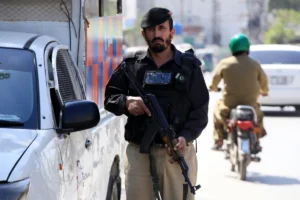Pakistan must get its house in order before it can rebuild Indian ties

By Riaz Khokhar
Pakistan’s new government is signalling a softening in attitude towards India, with Prime Minister Shehbaz Sharif saying he’s willing to enhance ties with India, defence minister Khawaja Asif expressing hope of better relations after India’s elections and foreign minister Mohammad Ishaq Dar considering the possibility of resuming trade ties.
Pakistan suspended trade with India in August 2019 after New Delhi revoked the semi-autonomous status of Indian-administered Kashmir, part of a territory both sides claim. Months before, after a deadly terrorist attack on an Indian paramilitary police convoy in Kashmir, India withdrew the most favoured nation (MFN) status for Pakistan and imposed import duties of 200 per cent.
For all of Pakistan’s overtures, terrorism must remain at the “centre of the conversation”, said Indian external affairs minister S. Jaishankar. India has long accused Pakistan of harbouring terrorists.
Public opinion in India has long been negative towards Pakistan. A Pew Research survey last year found that 73 per cent of Indians held an unfavourable view of Pakistan, a figure that has hardly dropped over the last decade. A large part of the reason are the 2008 Mumbai attacks, where Pakistani terrorists carried out a rampage targeting civilians.
Pakistan seems inclined to sideline the issues of terrorism and Kashmir to move forward. But for India, it is hard to see any significant benefits in resuming full relations with Pakistan.

For one thing, their ceasefire over Kashmir, reinstated in 2021, along the Line of Control, which divides Kashmir into two, has held despite the broken economic ties. In the past, even when relations were regular, border skirmishes have occurred – and could still erupt.
India’s ruling Bharatiya Janata Party, which has been nurturing a divisive pro-Hindu, anti-Muslim narrative, is likely to secure a third term in the coming elections. This political climate undermines the prospects for favourable ties with the Muslim state of Pakistan. It means that an Islamabad hoping to repair relations must offer significant confidence-building measures.
On top of that, India’s strained relationship with China after their 2020 Galwan Valley clash precludes Beijing from playing a moderating or mediating role in ways it could in the past.
Pakistan has grappled with political and economic instability, maintaining a modest growth rate of around 2 per cent and experiencing institutional rivalries among state entities like the military, the judiciary and political parties.
Extending an olive branch to India appears to be a partially pragmatic move for Islamabad. But any resumption of trade ties requires that Pakistan first address its internal issues, including achieving political and economic stability, prosecuting militant leaders and shaping a persuasive narrative to garner public support within India for improved relations.
Security in Pakistan has so deteriorated that China has repeatedly had to halt work on its projects. Last month, a terrorist attack killed five Chinese engineers working on the Dasu hydropower project. In 2021, a similar attack left nine Chinese dam workers dead.
Pakistan finds itself entangled in a maze of terrorism, much of which it inadvertently fostered. In contrast, the neighbouring Arab countries that once funded terrorism and sectarian violence in the 1980s have long moved on. They are modernising their industrial sectors and softening their religious fervour and related restrictions in society.
They are leveraging China’s technological prowess in the green energy sector and in 5G communication to replicate the same in their countries, and upgrading their local talent and domestic industries. Their focus on economic development and diversification has also brought them closer to India, with multibillion-dollar investment agreements to be signed.
Pakistan had a golden opportunity to capitalise on China’s investments and technological collaboration to advance its industries and create a more skilled workforce. Instead, it let controversies overshadow these prospects. The lack of progress on the China-Pakistan Economic Corridor is partly a function of the country’s internal political bickering and its succumbing to American pressure.
In contrast, many Southeast Asian nations have managed to withstand the geopolitical pressure to reap the dividends of China’s help across their industrial, infrastructure and tech sectors. For instance, Indonesia has become a dominant exporter of refined nickel, thanks to Beijing’s financial and technological support.
As long as Islamabad’s trajectory is marked by escalating religious extremism, terrorism, and political as well as economic instability, it can offer no favourable environment in which to pursue economic engagement with India.




